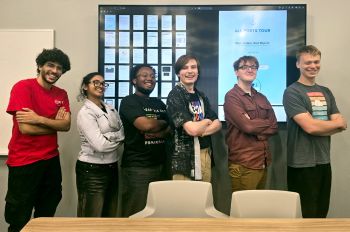Illinois Tech’s New $6 Million NSF Grant to Further Research That Will Translate into Societal Solutions, Diversifying Chicago’s Tech Sectors

Illinois Institute of Technology has received a significant investment of $6 million from the United States National Science Foundation (NSF) under its Accelerating Research Translation (ART) initiative. This landmark funding positions Illinois Tech at the forefront of translating academic research into practical, societal solutions, in alignment with the NSF’s commitment to fostering technological innovation and partnerships.
Through the ART program, part of the TechForward initiative, Illinois Tech will foster market-focused research and develop a more diverse workforce in high-growth technology sectors. The initiative is a collaborative effort, incorporating industry professionals and faculty in Chicago’s tech ecosystem, focusing on translating research for societal benefit and speeding up technology transfer.
TechForward recognizes the importance of diversity and inclusivity as drivers of innovation. It aims to engage underrepresented populations, including first-generation college students and other learners from diverse backgrounds in the Chicago Metropolitan Region, in practical commercialization experiences within high-growth technology sectors. With Chicago’s diverse racial demographics, especially in Bronzeville, where Illinois Tech is located, the initiative directly addresses disparities in tech entrepreneurship.
“At Illinois Tech, we believe that the richness of ideas comes from a diverse mix of minds,” says Illinois Tech provost and senior vice president for academic affairs Kenneth T. Christensen. “It’s this diversity that will drive the next wave of technological breakthroughs and societal advancements.”
The low representation of Black and Latino tech founders in Chicago, currently at only 6 percent, underscores a crucial gap. Illinois Tech, situated in the predominantly Black neighborhood of Bronzeville, is uniquely positioned to directly address this disparity and enrich the tech sector with a broader range of perspectives and talents.
TechForward’s project is designed to expedite the translation of Illinois Tech’s use-inspired research. By leveraging the expertise of industry professionals from Chicago’s tech ecosystem and integrating the resources of Illinois Tech’s entrepreneurship and innovation hub, the Ed Kaplan Family Institute for Innovation and Tech Entrepreneurship, the initiative will enhance the technology transfer process.
“Illinois Tech stands as a beacon of how education can be intertwined with real-world impact,” says Kaplan Institute executive director Maryam Saleh. “This program provides a unique opportunity for students to engage in translating academic research into practical, community-driven solutions, while increasing our capacity to translate research to practice.”
The objective is to transform at least 40 percent of seed translational research projects into commercial opportunities, as evidenced by negotiated licenses within two years of project acceleration. This initiative will cultivate a diverse talent pool in Chicago’s high-growth technology sector, creating experiential training programs in research commercialization. These programs are tailored for both degree-seeking students and non-degree seeking individuals from underrepresented backgrounds in the Chicago Metropolitan region.
“Our goal is to empower learners from all backgrounds, connecting them with researchers and industry professionals to create impactful, real-world solutions,” says Kaplan Institute academic director and Carl and Paul Bodine Endowed Chair in Electrical and Computer Engineering Mahesh Krishnamurthy. “At Illinois Tech, we're building bridges that turn academic research into societal benefits.”
The commercialization training program, offered both physically and online, will train learners to collaborate with faculty and seasoned industry professionals in advancing seed translational research projects. By the end of the initiative, TechForward aims to have provided commercialization training to at least 150 degree-seeking students and 100 under-represented non-degree seeking learners.
Illinois Tech, under this initiative, is set to fund two transformative research projects each year for four years. Projects eligible for this funding are those ready for translation, poised to make a tangible societal impact.
The first project to benefit from this investment is Assistant Professor Mohammad Asadi’s groundbreaking research in green propane production. Asadi’s work, which involves converting carbon dioxide into propane using a novel electrolyzer, is a perfect example of the type of impactful translational research that the ART initiative aims to support.
“Professor Asadi’s work is a prime example of how Illinois Tech’s research is not only innovative but also immensely impactful,” said Vice Provost for Research Fred Hickernell. “It reflects our commitment to addressing global challenges, such as climate change, through practical, sustainable solutions.”
This innovation developed at Illinois Tech and detailed in a recent Nature Energy paper is considered economically feasible for large-scale application. Asadi’s device uses a unique catalytic system with inexpensive, readily available materials to produce tri-carbon molecules, essential for fuels like propane. The technology, supported by the National Science Foundation and others, has been tested in a laboratory-scale flow electrolyzer prototype, demonstrating potential for sustainable, economically viable carbon capture and utilization. This research aligns with national goals for net-zero greenhouse gas emissions and represents a significant stride in closing the carbon cycle. The NSF ART investment will allow Asadi’s team to hire an entrepreneur in residence, ensuring research is tested in realistic environments.
Asadi’s pioneering work, involving the conversion of carbon dioxide into propane using a novel electrolyzer, showcases Illinois Tech’s dedication to sustainable and economically viable solutions.
The first-ever Accelerating Research Translation (ART) investment awarded more than $100 million to 18 teams at academic institutions across the nation. NSF’s investment will enable academic institutions to accelerate the pace and scale of translational research that will grow the nation's economy.
“NSF endeavors to empower academic institutions to build the pathways and structures needed to speed and scale their research into products and services that benefit the nation,” says NSF director Sethuraman Panchanathan. “The Accelerating Research Translation program in NSF’s new Technology, Innovation and Partnerships (TIP) Directorate identifies, and champions institutions positioned to expand their research translation capacity by investing in activities essential to move results to practice.”
Each ART awardee will receive up to $6 million over four years to identify and build upon academic research with the potential for technology transfer and societal and economic impacts, to ensure availability of staff with technology transfer expertise, and to support the education and training of entrepreneurial faculty and students. Each ART awardee institution will benefit from having a partnership with a mentoring institution of higher education that already has a robust ecosystem for translational research. A strong partnership between the awardee institution and a mentoring institution with an established translational research ecosystem is one of the unique features of the ART program.
A unique feature of the program is a partnership with a mentoring institution that has a robust ecosystem for translational research. Illinois Tech has partnered with the University of Chicago, which through a sub-award will share technology management and licensing administration best practices. Led by the Polsky Center for Entrepreneurship and Innovation, which houses the University of Chicago’s technology transfer function, other activities will include establishing standardized processes and sharing agreement templates. The Polsky Center will also provide educational seminars and case-by-case consultation, in addition to making various entrepreneurship programming available to Illinois Tech students, staff, and faculty.
“We at the University of Chicago are excited to collaborate with Illinois Tech in this transformative endeavor,” says Bill Payne, executive director of science and technology at the Polsky Center for Entrepreneurship and Innovation at Illinois Tech’s mentor institution, University of Chicago. “As a fellow mission-driven university on Chicago’s South Side, we share a commitment to fostering innovation and inclusive growth within our vibrant community.”
Launched by NSF’s TIP Directorate, the ART program directly addresses a long-standing gap between academic research and the products, services and solutions Americans need.
While ART seeks to build capacity and infrastructure for translational research at U.S. IHEs, the program also aims to enhance the role of IHEs in regional innovation ecosystems and effectively train graduate students and postdoctoral researchers in translational research, benefiting them across a range of career options. The program is authorized by the CHIPS and Science Act of 2022.
For more information, visit the ART program webpage.
Disclaimer: “Any opinions, findings and conclusions or recommendations expressed in this material are those of the author(s) and do not necessarily reflect the views of the National Science Foundation.”
Photo credit: National Science Foundation




